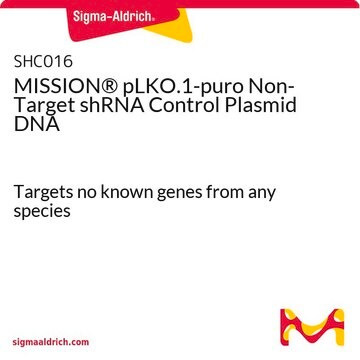EHU051011
MISSION® esiRNA
targeting human PLK1
About This Item
Empfohlene Produkte
Beschreibung
Powered by Eupheria Biotech
Qualitätsniveau
Produktlinie
MISSION®
Form
lyophilized powder
esiRNA cDNA-Zielsequenz
CTGCACCGAAACCGAGTTATTCATCGAGACCTCAAGCTGGGCAACCTTTTCCTGAATGAAGATCTGGAGGTGAAAATAGGGGATTTTGGACTGGCAACCAAAGTCGAATATGACGGGGAGAGGAAGAAGACCCTGTGTGGGACTCCTAATTACATAGCTCCCGAGGTGCTGAGCAAGAAAGGGCACAGTTTCGAGGTGGATGTGTGGTCCATTGGGTGTATCATGTATACCTTGTTAGTGGGCAAACCACCTTTTGAGACTTCTTGCCTAAAAGAGACCTACCTCCGGATCAAGAAGAATGAATACAGTATTCCCAAGCACATCAACCCCGTGGCCGCCTCCCTCATCCAGAAGATGCTTCAGACAGATCCCACTGCCCGCCCAACCATTAACGAGCTGCT
Ensembl | Human Hinterlegungsnummer
NCBI-Hinterlegungsnummer
Versandbedingung
ambient
Lagertemp.
−20°C
Angaben zum Gen
human ... PLK1(5347) , PLK1(5347)
Allgemeine Beschreibung
For additional details as well as to view all available esiRNA options, please visit SigmaAldrich.com/esiRNA.
Rechtliche Hinweise
Lagerklassenschlüssel
10 - Combustible liquids
Flammpunkt (°F)
Not applicable
Flammpunkt (°C)
Not applicable
Analysenzertifikate (COA)
Suchen Sie nach Analysenzertifikate (COA), indem Sie die Lot-/Chargennummer des Produkts eingeben. Lot- und Chargennummern sind auf dem Produktetikett hinter den Wörtern ‘Lot’ oder ‘Batch’ (Lot oder Charge) zu finden.
Besitzen Sie dieses Produkt bereits?
In der Dokumentenbibliothek finden Sie die Dokumentation zu den Produkten, die Sie kürzlich erworben haben.
Unser Team von Wissenschaftlern verfügt über Erfahrung in allen Forschungsbereichen einschließlich Life Science, Materialwissenschaften, chemischer Synthese, Chromatographie, Analytik und vielen mehr..
Setzen Sie sich mit dem technischen Dienst in Verbindung.







